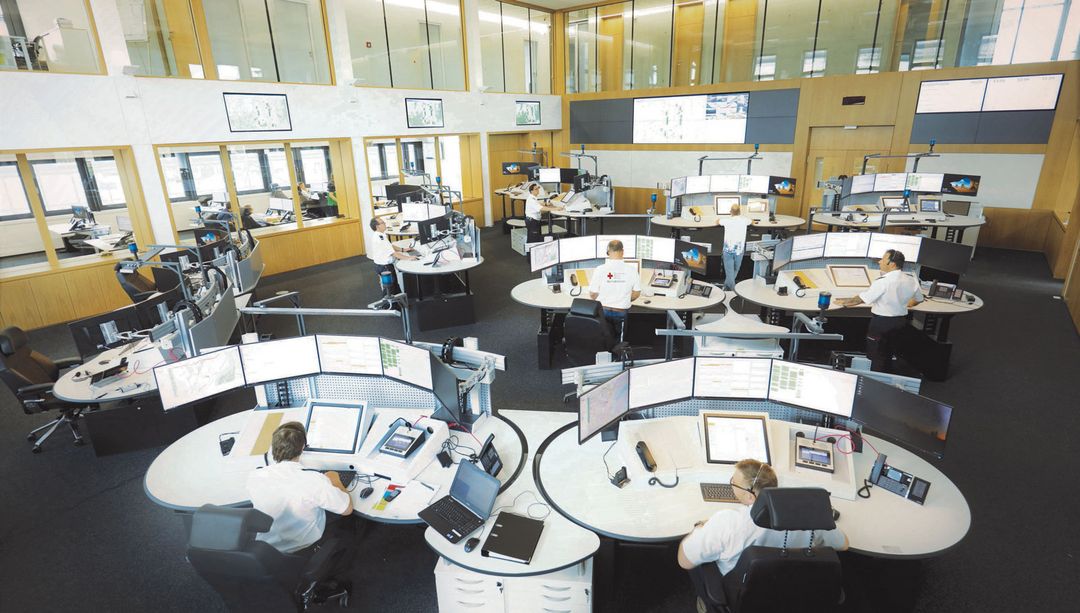The rescue control center is the information and communication center for disaster control, fire departments, rescue services and police. This is where emergency calls are received, emergency personnel are alerted, resources are planned and operations are coordinated. In normal operation, up to 200 messages per hour are received. In the event of widespread crises, such as natural or environmental disasters or widespread power outages, the number quickly rises to thousands. Pandemics are also exceptional situations in which supply capacities must be recorded and resources planned. In such cases, a control center is quickly overloaded.
Today, control centers work predominantly in isolation and have hardly any access to data among themselves. There is currently no systematic networking of information. This becomes problematic, for example, in cases that cross national borders. Prof. Dr. Ralph Bergmann, project manager and head of the topic field of Experience-based Learning Systems at the DFKI branch office at the University of Trier: “AI-based solutions, based on a comprehensive data and knowledge base, can significantly increase the efficiency of control centers and ultimately save time. In this way, the health of the population can be better protected and threats to critical infrastructure and systemic logistics, industrial and economic sectors can be detected and mitigated earlier. With SPELL, we aim to bring together relevant information from previously distributed sources so that it can be analyzed and processed with appropriate applications. The end goal is to create a sustainable hybrid platform on which other providers can also develop and offer new AI services.”
Understanding data, learning and harnessing experience
SPELL stands for “Semantic Platform for Intelligent Decision and Operations Support in Control Centers and Situation Management.” It is based on semantic technologies that understand the meaning and context of data, give it a meaning and make it usable for intelligent links. For example, if a vehicle is involved in an accident, this is initially only vague information. If this is supplemented with the context that it is a hazardous goods transport and the accident site is in a water protection area, the information becomes much more meaningful and can be further processed in a more targeted manner.
Some information can also be used to simulate the further course of crises. Here, the project team relies on the expertise and proven systems of the scientists in the DFKI Cognitive Social Simulation topic area at the University of Trier. "With our prognostic tools, which combine simulation algorithms and cognitive modeling with machine learning methods, the utilization of certain resources can be predicted even when complex influencing factors are taken into account, and preventive measures can be better estimated. All of this can contribute to a clearer picture of the situation, on the basis of which operational command can make better decisions, according to topic area leader Prof. Dr. Ingo Timm. "The results and experience from the AScore project, in which we are developing a pandemic cockpit for municipalities, can be optimally incorporated into SPELL."
Another real-world problem the researchers want to address is how to reprocess lessons learned from past deployments. Often, these are not recycled. Yet the information from them can be valuable for acute mission planning in comparable situations as well as for the development of crisis plans. This is where case-based reasoning (CBR) technologies, the specialty of Prof. Bergmann's group, are to be applied.
An ecosystem for new applications
The project, which is funded by the German Federal Ministry for Economic Affairs and Energy (BMWi), was launched in June 2021 and is scheduled to last three years. The funding amount is just under 12 million euros. After the project period and testing, the SPELL platform is to be operated productively on a permanent basis and gradually expanded into a distributed infrastructure. It is to be established as a central AI-based information platform for the approximately 250 BOS control centers in Germany and also integrated into industrial, campus and building management systems. Standardization and openness of the platform will create a comprehensive ecosystem for which a sustainable business and operating model will be implemented.
The project partners also hope that SPELL will provide impetus for policymakers, for example with regard to data protection rules: “Data protection is a valuable asset and must be given special consideration in the comprehensive networking of different public and private sources. A central question is who is allowed to see what information and for what purpose. Here we need to take a close look at where there is a need for improvement,” says Ralph Bergmann.
The consortium:
- Deutsches Rotes Kreuz, Landesverband Rheinland-Pfalz e.V.
- Empolis Information Management GmbH
- Fraunhofer Institut für Experimentelles Software Engineering IESE
- Fraunhofer Institut für Offene Kommunikationssysteme FOKUS
- Universität Darmstadt (TUDA)
- Verband für Sicherheitstechnik (VfS)
- Advancis Software & Services GmbH
- ISE Informatikgesellschaft für Software-Entwicklung mbH
- LiveReader GmbH
- Corvevas GmbH & Co. KG
- apheris AI GmbH
- BASF SE, AP/CM

